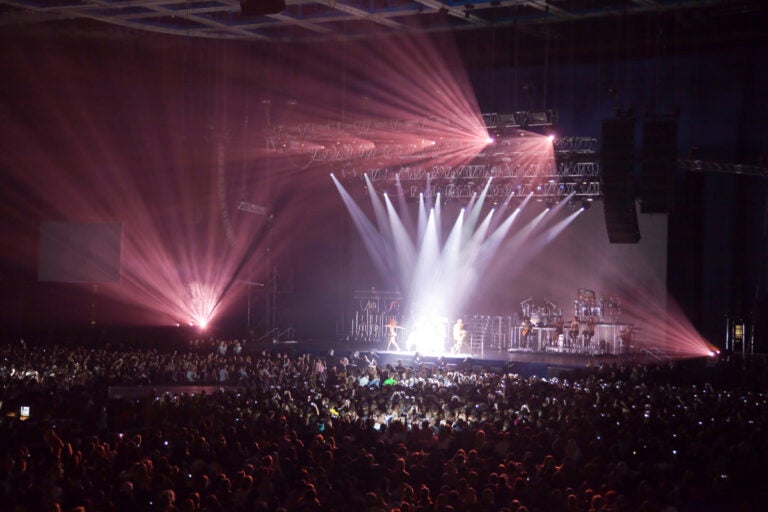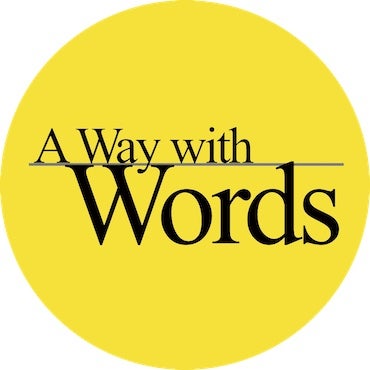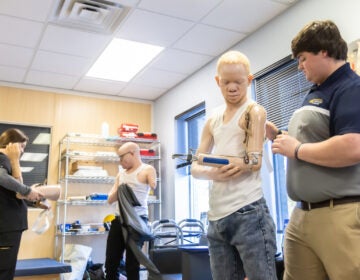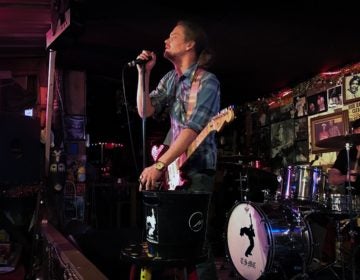Do concerts have to be so loud that you need earplugs?
Earplugs can prevent permanent hearing damage from concerts. Venue staff and musicians say that now it’s common, even cool, to have them.
Listen 09:48
Going to loud concerts can lead to permanent hearing damage, but the culture around earplugs is changing. (Bigstock/Paha_L)
This story is from The Pulse, a weekly health and science podcast. Subscribe on Apple Podcasts, Spotify, or wherever you get your podcasts.
Listen to the full episode on How Noise Affects Our Health
Benjamin Schurr, bass guitarist for the band Song People, still remembers one house show he went to in Washington D.C.
“There was a punk house that I went to, and they were like, “I hope everybody brought earplugs,” and then managed to play this … just crushingly loud set of music.”
Schurr stuffed his ears with toilet paper but emerged with permanent hearing damage in his right ear.
There are a few reasons why concerts are so dangerously loud that audiologists, staff at music venues, and even musicians recommend concert-goers wear earplugs. First, the instruments and vocals on stage are competing, explained Sean Svadlenak, production manager at MilkBoy, an independent music venue in Philadelphia.
“It has to be louder than the next loudest thing,” he said. “And that applies even with no one in the room. So, if you want to hear every word or syllable your favorite singer is singing, that all has to be louder than the snare drum on stage; it has to be louder than the crash cymbal.”
Also, concertgoers just like loud music. Anna Reed, general manager at MilkBoy, said she is a fan of metal music, because “when it’s so loud, you can’t hear yourself think. And … instead of being like a hype-up kind of experience for me, it’s like a relaxing and calming experience.”
“If you’re worried about something, if you’re sad, it … just doesn’t let you think about it, because your ears are being totally flooded, and your brain is being totally flooded with just an overload of sound.”
In 2017, David Welch, a professor of audiology at the University of Auckland in New Zealand, looked into why people like loud music. He surveyed guests and employees at nightclubs, and concluded that people learn to associate loud music with fun, like how the Russian physiologist Ivan Pavlov famously trained dogs to associate the sound of a bell with food.
“We tend to have loud sound during happy times, so people get used to that association. If every time you have a party … every time you meet your friends, every time you go out, there’s loud music playing, you start to … want the loud music in itself.”
He added that people get used to hearing loud music at clubs and concerts and come to expect it.
Subscribe to The Pulse
Going to loud concerts can lead to permanent hearing damage, but the culture around earplugs is changing, such that it’s common, and even cool, to wear them at concerts.
Schurr, the guitarist for Song People, said that now, “there’s kind of a vibe or an aesthetic to the earplugs you keep on your keychain. It’s kind of like a signal that … not only do you care about your ears, but you go to shows.”
Shaina Kapeluck, lead singer for Song People, agreed: “I just am more likely to see a jar of earplugs on the bar, or see a jar of earplugs near the door where somebody is taking the door money.”
Another change is that earplugs are better designed now. Anna Bixler, a clinical audiologist at Jefferson Health in Philadelphia, explained that regular earplugs from a pharmacy may distort the sound of music, but there are now specially designed concert earplugs that make the music still sound good, just not as loud. She’s a big fan of concerts, especially electronic dance music, and has earplugs that glow in the dark.
“I will have people stop me and talk to me about it, which I love. I think any way to talk about it and get more people informed is really awesome and show people it’s cool to protect your hearing.”

Mary Kim, clinical audiologist at Penn Medicine in Philadelphia, said she tells her patients to think of earplugs like sunscreen — people should keep them around if they know they will be exposed to dangerous levels of UV light or, in this case, sound.
“These noise effects are permanent; they’re not reversible once they happen,” she said. “At a certain point in our hearing … our ears essentially become like broken speakers, and even with volume that hearing aids can provide, our ears are not able to provide us with that clarity.”
Svadlenak, the production manager at MilkBoy, says people should think about wearing earplugs to shows to protect their ears, so they can listen to their favorite artists hopefully for many more years to come.
WHYY is your source for fact-based, in-depth journalism and information. As a nonprofit organization, we rely on financial support from readers like you. Please give today.







